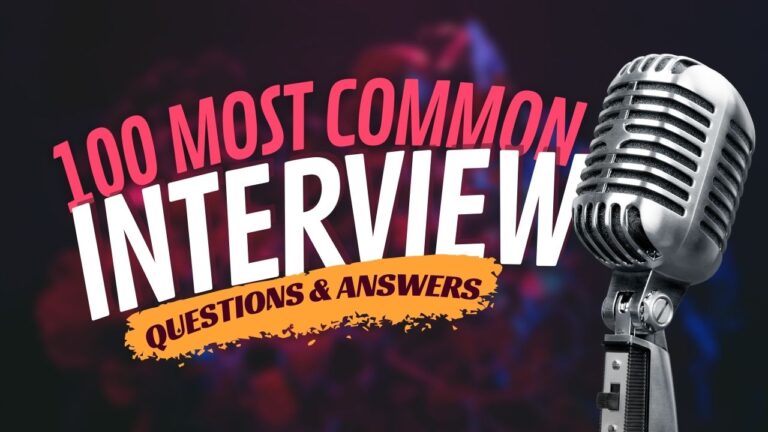100 Interview Questions for Job at Deloitte: Essential Guide

Landing a job at Deloitte can mark the start of a rewarding career. As you prepare for your interview, it’s key to know what questions you might face. With this guide, you’re going to discover 100 questions that interviewers at Deloitte commonly ask.

Understanding these questions not only helps you get ready for the interview but also boosts your confidence. Being well-prepared shows your dedication and gives you a better chance to make a strong impression. Dive into this list and equip yourself with what you need to stand out from other candidates for Job at Deloitte.
Whether it’s focusing on your skills or aligning with Deloitte’s core values, knowing what to expect will help you plan your responses effectively. This list offers a practical resource for stepping into your interview with assurance and clarity.
Understanding the Interview Process at Deloitte

Applying for a job at Deloitte means preparing for a rigorous, structured interview process. This process usually involves several stages: campus recruiting events, screening and assessments, and in-depth interview stages.
Campus Recruiting and Events
Deloitte often hosts events at universities to connect with students. These campus events provide a chance to learn more about the company culture and job openings.
Participation in these events might even lead to opportunities for campus placements or interviews. It’s beneficial to engage actively and show genuine interest during these events, as they often influence the next steps in the hiring process.
Screening and Assessments Job Interview at Deloitte
The initial phase after application involves screening your resume and profile. If selected, you may need to complete several assessments. These can include an aptitude test, which checks your problem-solving skills, and sometimes a versant test to evaluate your communication abilities.
After the assessments, your scores are reviewed alongside your application. Only those who meet the required criteria move forward. Strong performance in these tests and a solid application are crucial at this stage.
In-depth Interview Stages at Deloitte
If you clear the screening phase, you move on to more detailed interviews. These typically consist of multiple rounds, which may include both technical and behavioral interviews.
Deloitte aims to assess your practical skills, how you fit into their culture, and your potential for growth. Often, interviews can be done by phone, video, or in person. Ensuring you are prepared and familiar with common questions is key.
An employee referral might also be beneficial in this process, offering more context about your capabilities to the interview panel.
List of 100 Interview Questions for Job at Deloitte
1. How do you apply the time management method in your problem-solving approach?
2. Describe a challenging group discussion you were part of and your role in it.
3. How would you handle spontaneous responses in a high-pressure situation?
4. Explain the difference between internal and external audit processes.
5. What techniques do you use for accurate revenue recognition?
6. How do you prioritize tasks when faced with multiple deadlines?
7. Describe a time when you disagreed with a team member during a project.
8. What strategies would you employ to lead a group discussion round effectively?
9. How would you assess the effectiveness of an audit report?
10. Discuss a situation where you had to adapt quickly to unexpected changes.
11. What are the key challenges of auditing for a multinational firm like Deloitte?
12. Explain your approach to managing client expectations during an audit.
13. How do you ensure compliance with audit standards and regulations?
14. Describe your experience with ERP systems in auditing.
15. How do you handle ethical dilemmas in the workplace?
16. Discuss a successful collaboration with a diverse team.
17. What methods do you use to verify financial statements’ accuracy?
18. How do you manage stress during tight audit cycles?
19. Describe a project where you had to deliver under strict time constraints.
20. What do you consider the most important skill for an auditor at Deloitte?
21. How do you stay updated with changes in audit regulations?
22. Explain the importance of confidentiality in auditing.
23. How would you improve communication in a team setting?
24. Discuss your experience with risk management audits.
25. Describe a situation where you had to present complex information clearly.
26. How do you prioritize tasks in a dynamic work environment?
27. What is your approach to continuous professional development?
28. Describe how you handle conflicts in a team.
29. How do you evaluate financial health during an audit?
30. What techniques do you use to ensure accuracy in your work?
31. Why do you want to work at Deloitte?
32. How do you align your goals with those of the organization?
33. Describe a time you had to learn a new software quickly.
34. How do you address underperformance in a team project?
35. What strategies do you use for effective time management?
36. Discuss a time you had to change your communication style.
37. Explain the role of data analytics in auditing.
38. How do you ensure integrity in your work?
39. Describe a project where you exceeded expectations.
40. How do you balance quality and efficiency in audit tasks?
41. What do you see as the future challenges in auditing?
42. How do you foster innovation in your work processes?
43. Describe a time you had to defend your recommendations.
44. How do you build trust with clients?
45. What role does feedback play in your professional development?
46. Explain how you handle high-pressure situations.
47. How do you ensure collaboration across departments?
48. Discuss a time when you had to handle multiple priorities.
49. What is your strategy for continuous improvement?
50. How do you maintain motivation during long projects?
51. Describe a time when you solved a complex business problem.
52. How do you use technology to improve audit efficiency?
53. What steps do you take to manage audit risks?
54. How do you handle ambiguity in financial data?
55. Describe a time you provided critical feedback to a colleague.
56. How do you support team members to achieve their full potential?
57. Discuss the importance of diversity in the workplace.
58. How do you approach decision-making under uncertainty?
59. Describe your familiarity with International Financial Reporting Standards.
60. How do you ensure alignment with organizational goals?
61. What are your strategies for conflict resolution?
62. Describe your role in enhancing audit effectiveness.
63. How do you adapt to new audit methodologies?
64. Explain the importance of strategic thinking in auditing.
65. How do you incorporate ethical considerations in your work?
66. Describe a time when you had to make a difficult decision quickly.
67. How do you evaluate the scalability of an audit process?
68. What approach do you take to learn from mistakes?
69. Describe your experience with compliance audits.
70. How do you measure the success of an audit engagement?
71. What role does leadership play in audit projects?
72. How do you maintain a high level of accuracy in your work?
73. Describe your strategy for handling large datasets.
74. How do you address gaps in team knowledge or skills?
75. Discuss a time you inspired others to achieve a common goal.
76. How do you prioritize relationships with stakeholders?
77. Describe a time you implemented a new auditing tool or technology.
78. How do you ensure effective communication in remote teams?
79. What initiatives have you taken to enhance audit efficiency?
80. Discuss your approach to sustainable business practices in auditing.
81. How do you maintain a balance between client demands and audit requirements?
82. Describe a project that required you to innovate.
83. What do you consider when evaluating audit evidence?
84. How do you approach talent development within your team?
85. Describe a situation where you had to manage financial discrepancies.
86. How do you handle feedback from clients or supervisors?
87. What techniques do you use to facilitate effective team discussions?
88. How do you align your performance with Deloitte’s values?
89. Describe a time you streamlined a process to improve efficiency.
90. How do you create a positive work environment?
91. What strategies do you use for mentoring junior team members?
92. How do you overcome challenges in cross-functional projects?
93. Describe your role in ensuring project deliverables meet quality standards.
94. How do you prepare for significant organizational changes?
95. Discuss the role of technology in risk management.
96. How do you address shortcomings in financial reports?
97. Describe your involvement in leadership roles outside of work.
98. How do you prioritize ethical standards in your decision-making process?
99. What steps do you take to ensure the accuracy of data analysis?
100. How do you contribute to a culture of continuous learning and development?
Job-Specific Preparation for Interview at Deloitte

In preparing for a job interview at Deloitte, focus on the job description, required skills, and relevant experiences. Understanding these elements will help you match your abilities to what Deloitte seeks. Highlight technical knowledge in auditing and risk, while showing flexibility with transferable skills.
Understanding the Job Description
Read the job description closely. Identify key responsibilities like auditing, risk assessment, or server management. Note any specialized tools or systems, such as Spotfire architecture, mentioned in the listing.
Consider creating a simple table to track these details:
| Requirements | Your Skills/Experience |
|---|---|
| Auditing | 3 years in auditing at ABC Corp |
| Risk assessment | Managed risk projects at XYZ Ltd |
| Spotfire architecture | Familiar with Spotfire in projects |
Use this to pinpoint areas where your skills match the job’s needs.
Relevant Experience and Skills
Highlight your job-related experience. If you have been part of auditing teams, managed risk assessments, or dealt with server management, mention these.
Focus on measurable achievements. Did you save a company money by improving audit processes? Use bullet points to list these experiences clearly and concisely. This will emphasize your expertise in a structured way, showcasing real results.
Technical Knowledge in Auditing and Risk
Showcase your technical skills in auditing and risk. Be ready to discuss terms like compliance standards and risk mitigation strategies. You might include certifications or training courses you have completed.
Keep explanations simple, such as what software you’ve used or the number of audits you have conducted. The goal is to convey your competence without unnecessary complexity.
Transferable Skills and Adaptability
Emphasize skills that apply across various jobs, such as communication, or, problem-solving. Explain how these skills have helped you adapt in new environments or tackle challenges in your previous roles.
Describe specific examples where your adaptability was tested. Did you switch projects quickly? Did you learn new software under a tight deadline? Share these instances to show how you can handle change effectively.
Frequently Asked Questions
Deloitte values integrity, collaboration, and excellence. You should be prepared for topics like managing challenging projects and leading diverse teams. It’s also helpful to discuss keeping up with industry changes and ensuring compliance.
What can you tell us about Deloitte’s core values and how they align with your personal values?
Deloitte’s core values emphasize integrity, service, teamwork, and excellence. When discussing how these align with your personal values, consider examples from your experience. Think about how you prioritize ethical behavior, collaboration, and striving for high-quality work. Sharing your approach helps demonstrate your fit with Deloitte’s culture.
Can you describe a challenging project you managed and how you led your team to success?
Talk about specific challenges you faced and strategies you implemented to overcome them. Share how you motivated and guided your team towards achieving project goals. Highlight key actions you took, like setting clear objectives or using efficient communication. This shows your ability to handle difficult situations.

How do you approach working with large, diverse teams on complex projects?
Focus on your ability to foster inclusive, cooperative environments. Discuss tools and methods you use to ensure everyone’s voice is heard. Explain how you manage different ideas and cultures to drive innovation and achieve project objectives. This highlights your adaptability and leadership skills.
What strategies would you implement to ensure compliance with tax laws and regulations in a new project?
Explain how you stay informed about the latest tax laws and standards. Detail steps you take to maintain compliance, like regular audits and using reliable tax software. Share examples of how you’ve successfully navigated regulatory challenges. This demonstrates your knowledge and dependability.
How do you maintain your professional development and stay updated with changes in the consulting industry?
List the resources you use, like industry publications, webinars, and professional networks. Mention any certifications or courses undertaken to remain current. Talk about how you apply new knowledge and skills to your role. This shows your commitment to lifelong learning and advancement in your field.
All the Best !






